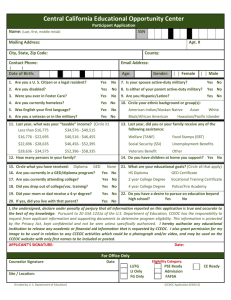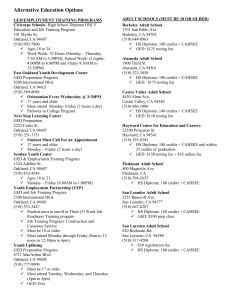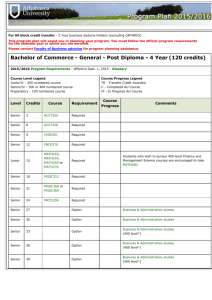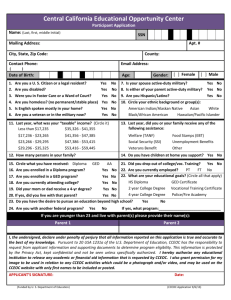know before you go - Alliance for Children's Rights
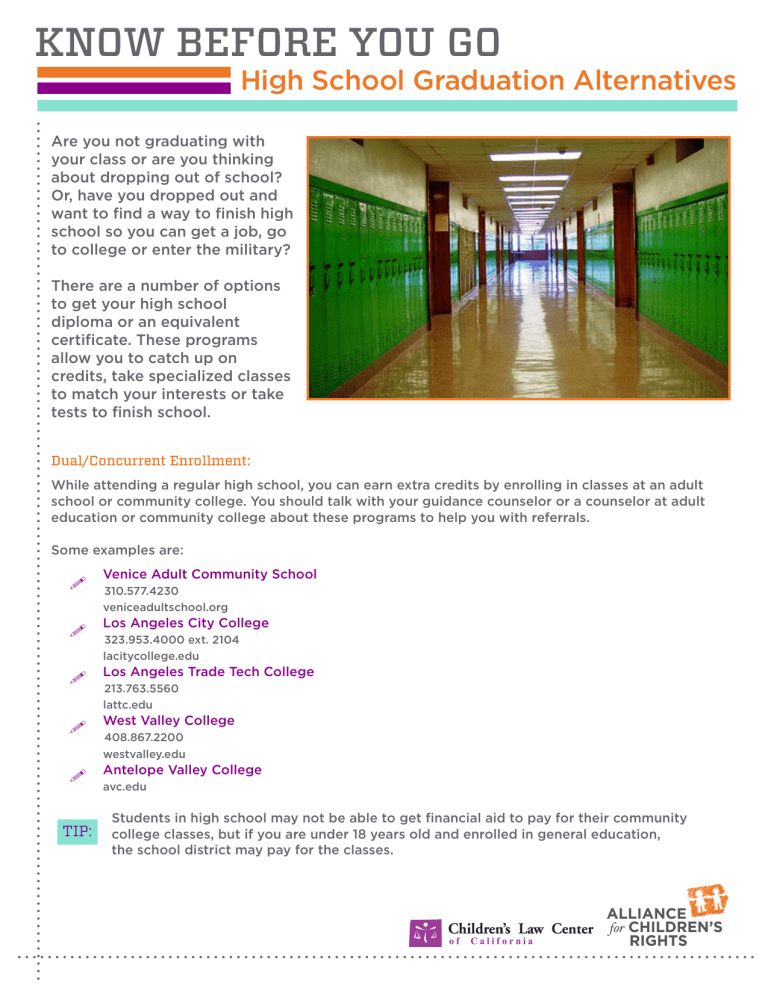
KNOW BEFORE YOU GO
High School Graduation Alternatives
Are you not graduating with your class or are you thinking about dropping out of school?
Or, have you dropped out and want to find a way to finish high school so you can get a job, go to college or enter the military?
There are a number of options to get your high school diploma or an equivalent certificate. These programs allow you to catch up on credits, take specialized classes to match your interests or take tests to finish school.
Dual/Concurrent Enrollment:
While attending a regular high school, you can earn extra credits by enrolling in classes at an adult school or community college. You should talk with your guidance counselor or a counselor at adult education or community college about these programs to help you with referrals.
Some examples are:
Venice Adult Community School
310.577.4230
veniceadultschool.org
Los Angeles City College
323.953.4000 ext. 2104
lacitycollege.edu
Los Angeles Trade Tech College
213.763.5560
lattc.edu
West Valley College
408.867.2200
westvalley.edu
Antelope Valley College
avc.edu
TIP:
Students in high school may not be able to get financial aid to pay for their community
college classes, but if you are under 18 years old and enrolled in general education,
the school district may pay for the classes.
AB 167:
cfyetf.org (AB 167 Frequently Asked Questions)
Because foster youth are moved around a lot, sometimes they have to switch schools and it gets in the way of graduating on time. There is a law, commonly called “AB 167” that says: if foster youth are moved when they are in the 11th or 12th grade and that results in changing schools, then the new school must review the youth’s progress towards graduation. If the youth cannot graduate on time because he cannot
“reasonably complete” all the required credits, then the youth and their education rights holder have the right to request that the student graduate under AB 167. This means they have to meet state requirements instead of school district graduation requirements. However, the youth still has to pass the
California High School Exit Exam (CAHSEE) and pass specific classes required by the State of California.
Some myths about AB 167:
MYTH: Since I’m a foster youth, I don’t have to take all the classes that other youth take in order
to graduate.
FACT: AB 167 does not apply to all foster youth. The only foster youth that are eligible
are ones that moved foster homes or group homes in the 11th or 12th grade and had to
change schools because of the move.
MYTH: Since I’m a foster youth, I only need 130 credits to graduate.
FACT: Just because you have completed/passed 130 credits does not mean you are eligible for graduation under AB 167. You must complete specific classes, which may add up to 130 credits. You also have to pass the CAHSEE.
MYTH: If I graduate with an AB 167 diploma, I am not eligible to go to a Cal State or a UC college.
FACT: The issue with applying to a four-year college is not the fact that you earned a diploma under AB 167. The problem is that to be eligible for a four-year college, you have to take specific classes. Those classes are not required under AB 167. So, you may not have taken all the classes you need to apply to a four-year school. You should have no problem applying to a community college.
GED (General Education Development Test):
916.445.9438, www.cde.ca.gov/ta/tg/gd
The GED test is for a student over 17 years old and tests your knowledge on five subjects: Language
Arts-Reading, Language Arts-Writing, Math, Science and Social Studies.
By passing the GED, you earn your California High School Equivalency Certificate, but you do not earn a high school diploma. It will help you qualify for jobs that require a high school diploma and make you eligible for financial aid to pay for community college and vocational-technical certificate programs.
The GED is not a free test, you will be charged approximately $150 to $200 to take the test and $25 to retest a specific test. For exact costs: gedtestingservice.com
There are free GED preparation courses throughout Los Angeles. Look for classes/tests at your local adult education program and/or community college.
If you are a current or former foster or probation youth, you might be eligible for money to pay for the preparation course and test through Independent Living Program. Contact your ILP/
Transition Coordinator to see if you are eligible for financial support.
TIP: While a GED might be faster to get than a diploma, it is not an easy test and some military
branches and employers will not accept a GED the same as a high school diploma. So, choosing
a GED over a high school diploma may limit the types of jobs you can get.
GED Plus/Diploma Plus:
If you are a year or more behind in credits, you may be able to get a high school diplma through a GED
Plus or Diploma-Plus Program. To earn your diploma, you must complete ten specific classes and pass the GED and the CAHSEE. You can get information from your guidance counselor, some community colleges and skills centers.
Some examples are:
Venice Skills Center
310.664.5888 I www.lausd.net/Venice_Skills_Center
Los Angeles City College
323.953.4000 ext. 2104 I lacitycollege.edu
Los Angeles Trade Tech College
213.763.5560 I lattc.edu
West Valley College
408.876.2200 I westvalley.edu
Antelope Valley College www.avc.edu/studentservices/counseling/hsprogram.html
Pregnant Minor Schools:
If you are a pregnant or parenting teen, you may want to consider a school that provides extra support for you and your child. These schools provide 6th through 12th grade for parents or soon-to-be parents to get their high school diploma. Typically, they provide counseling by school nurses, information on health and nutrition, and pre-natal and infant care instruction.
McAlister High School
611 S Carondelet St Los Angeles, CA 90057
213.381.2823 I mcalisterhs-lausd-ca.schoolloop.com
Riley High School
1524 E 103rd St., Los Angeles CA 90002
323.563.6692
TIP:
If you are a pregnant or parenting teen with an open case in the dependency court, you may also be able to access help paying for childcare while you attend a regular school.
Speak to your social worker about what options might be available to you and discuss your
options at your PPT conference
Continuation High Schools:
If you are between 16 and 18 years old, and behind on credits, you may not graduate on time.
If this is the case, you may want to consider a “continuation school.” These programs are great for some youth because they allow you to make up and earn credits quickly so you can transfer back to your traditional high school when you are caught up on credits. Some programs take the form of independent study, where you complete work on your own and attend school for only a few hours a week, while others offer a full school day.
TIP:
The downside of these programs is they offer little time with a teacher or support if you are having trouble learning something. If you have been struggling to pass classes at your neighborhood school, you should ask them to offer you extra support and help there,
rather than suggesting a continuation school, where you might get even less help.
Alternative High Schools and Programs:
If you find that a general education high school does not work with your learning style or you are over 18 and your neighborhood high school has told you that you are too old to attend, then you might want to consider an alternative high school or program.
TIP:
You should keep in mind that some of these programs will require you to complete the work on your own with little or no help from a teacher. When considering a potential program, you should ask about the support offered. Sometimes schools will suggest that a youth enroll in an alternative program when they really need more support from their neigborhood school, such as special education services.
Some examples are:
Alternative Education and Work Center
AEWC is an independent study program that provides dropouts with an alternative way to earn a diploma.
www.adulted-lausd-ca.com/cms/page_view?d=x&piid=&vpid=1348994547377
Reconnections Career Academy
In partnership with various workforce programs, the Reconnections Career Academy serves youth ages 16-24 that have dropped out of high school. The program focuses on returning youth to school to complete their high school diploma or GED while they are exposed to career pathways in health care, construction or green technology.
213.744.9321 I kendra.madrid@lacity.org
Youth Build Charter High School
18 locations throughout L.A., San Bernadino, Riverside and Fresno counties. Accepts students 16-24 who have left high school without a diploma. Students receive career training, counseling and leadership development.
323.231.1146 I youthbuildcharter.org
LA Conservation Corps
Each program offers the required core subjects to pass the CAHSEE. lacorps.org
Eco Academy
For students aged 14 to 18 years old. In addition to academic classes, each student takes a class about the environment and participates in a community beautification project.
213.389.3103 I http://www.lacorps.org/alternative-education-program.php
Youth Opportunity High School
Youth Opportunities Unlimited (Y.O.U.) is a small school for youth between the ages of 14 and 21 who have not
been enrolled in school for at least 40 days. The school focuses on educational development, employment
training and youth and family development. youthopportunities.org
Young Adult Corps High School
This school caters to 18 to 24 year olds. It offers eight-week periods of high school classes that are separated by blocks of paid on-the-job training, giving each of its students real world experience.
323.249.7845 I http://www.lacorps.org/young-adult-corps.php
City of Angels School Virtual Academy
This school offers 9th and 10th graders a full-time, online classroom.
213.745.1100 I www.lausd.net/City_of_Angels/coava
Los Angeles Youth Network (LAYN)
LAYN’s Education program seeks to identify and eliminate barriers to academic growth, provide concrete support and advocacy for the educational rights of homeless yoth along with helping them establish and achieve realistic academic goals. 232.957.7757 I www.layn.org
Job Corps
Housing/school program for youth 16-24 to earn a high school diploma or GED while gaining job skills.
recruiting.jobcorps.gov
National Guard Grizzly Youth Academy and Sunburst Youth Academy
Academies offer 5-month programs where students live on campus and earn up to 55 credits towards a diploma.
800.926.0643, grizzlyyouthacademy.org I 877.463.1921, sunburstyouthacademy.org
For more information, visit kids-alliance.org or clccal.org.
© 2013


